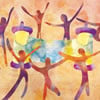
I tried saying it effortlessly, like I’d been saying it all my life.
“We’re going to New York for the Lag BaOmer parade,” I announced to my parents 28 years ago.
I figured, my parents knew what “New York” and “parade” were—maybe they would just let the “Lag BaOmer” part slide. Because if they asked me what Lag BaOmer was, my answer sounded like it was coming from someone else. Less than one year earlier, aI tried saying it effortlessly “log” was something you put in a fire, and I had no idea what a “BaOmer” was. I just knew it sounded too funny to say with a completely straight face.
Still, I needed to tell my parents something about the reason for my trip. So I repeated what I had learned from our rabbi: “Lag BaOmer is the day Rabbi Akiva’s students stopped dying, so it’s a day of celebration.” This would be my ready reply for years to anyone who asked about the holiday.
Of course, there was no fooling my parents back then. They knew and I knew that Rabbi Akiva and his students meant nothing to any of us, including me.
So why did our family follow the Rosenfelds, our rabbinic family in Pittsburgh, on a drive to New York (not Manhattan, mind you—Brooklyn!) to participate in a holiday that we knew nothing about? We had absolutely no frame of reference for it—no historical context, no experiences, no deeper lessons—gornisht. As in, nothing.
Partly, I wanted to go out of curiosity: Could “fun” and “Jewish” actually go together? But I also went because I wanted to know more. About Judaism. About my heritage. About a holiday with a funny name that had been on the Jewish calendar for thousands of years, yet had been on mine for less than one.
I can’t say that Lag BaOmer really resonated with me at the beginning. There aren’t any mitzvahs associated with the holiday. You don’t have to say certain prayers or eat certain foods. Our community holds a picnic celebration, but there’s nothing you have to do because it’s Lag BaOmer. Which means it was easy to dismiss Lag BaOmer as a “minor holiday,” especially during those years when providing my children with the basics of Judaism was already a huge commitment.
It’sIt’s easy to dismiss Lag BaOmer as a “minor holiday” only recently, since the fog of child-raising has lifted, that I can absorb more of the holiday’s significance. It’s hard to believe I missed it all these years. Because Lag BaOmer is also the yahrtzeit (anniversary of passing) of Rabbi Shimon bar Yochai, who authored the Zohar, the first book of Jewish mysticism. Rabbi Shimon unlocked the soul of Judaism in the second century, although only the most spiritually enlightened were allowed access to it. Today the Zohar’s essence flows through the teachings of Chassidism, with its wellsprings of self-knowledge available to any Jew, in any language, at any time. Rabbi Shimon opened the spiritual channel for us to know that G‑d is One. And that we are all created with an essential purpose—to reveal that Oneness.
“BaOmer” may always sound a little funny to me, but I’ve been nourished by these wellsprings, and I can honestly say that they have made all the difference in my life.





